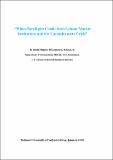When paradigms clash: Irish labour market institutions and the unemployment crisis

View/
Date
2017-10-18Author
Higgins, Daniel
Metadata
Show full item recordUsage
This item's downloads: 2317 (view details)
Abstract
The recent Irish economic and financial crisis had significant impacts on the performance of the labour market and was also associated with major changes to labour market policies and institutions. Drawing on Douglass North’s concept of adaptive efficiency, this thesis contributes to the political economy literature on how the key institutional changes came about given the conflicting interests and understandings among key labour market stakeholders. The current theoretical discord over Labour Market Institutions (LMIs) is central. The thesis is organised into five core chapters. In the first, I set the context for institutional change by establishing distinct phases of full employment, crisis, and then recovery discernible from the data. In chapter two I review the relevant theoretical literature on LMIs and suggest a systems approach, supported by the language of New Institutional Economics, which offers a much needed methodology of LMI development over time. Chapter three describes the arrangement of LMIs which constituted the Irish labour market system pre-crisis. Chapter four documents the reforms seen and describes the post-crisis system. Providing the core empirical contribution of the thesis, in chapter five I test the explanatory power of the theoretical framework through interviews with the key labour market stakeholders responsible for the structural adaptation from the pre-crisis to post-crisis system. This chapter suggests an explanation of the political economy of that structural adaptation of arrangements and the role of assumptions from economic theory in their bargaining. European structural reform as it relates to the labour market occurs within a political-economy context, with the localisation of an identifiable body of general LMI theory largely determining institutional outcomes.

